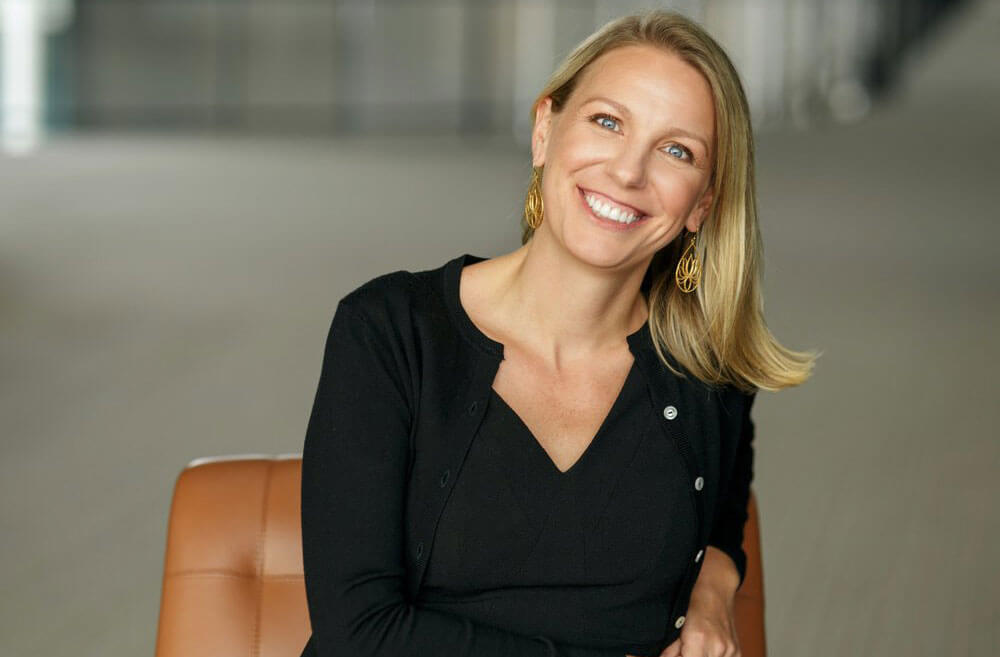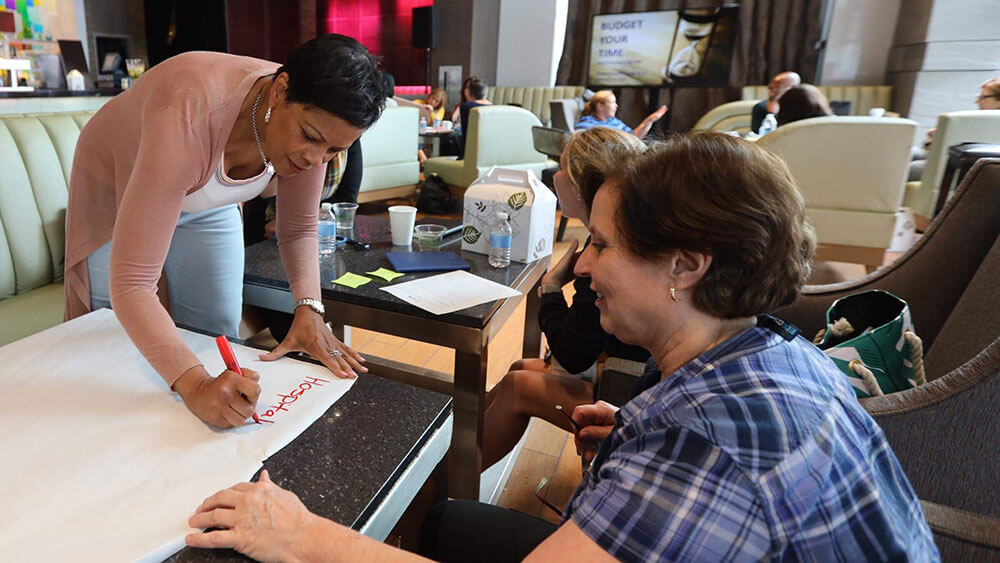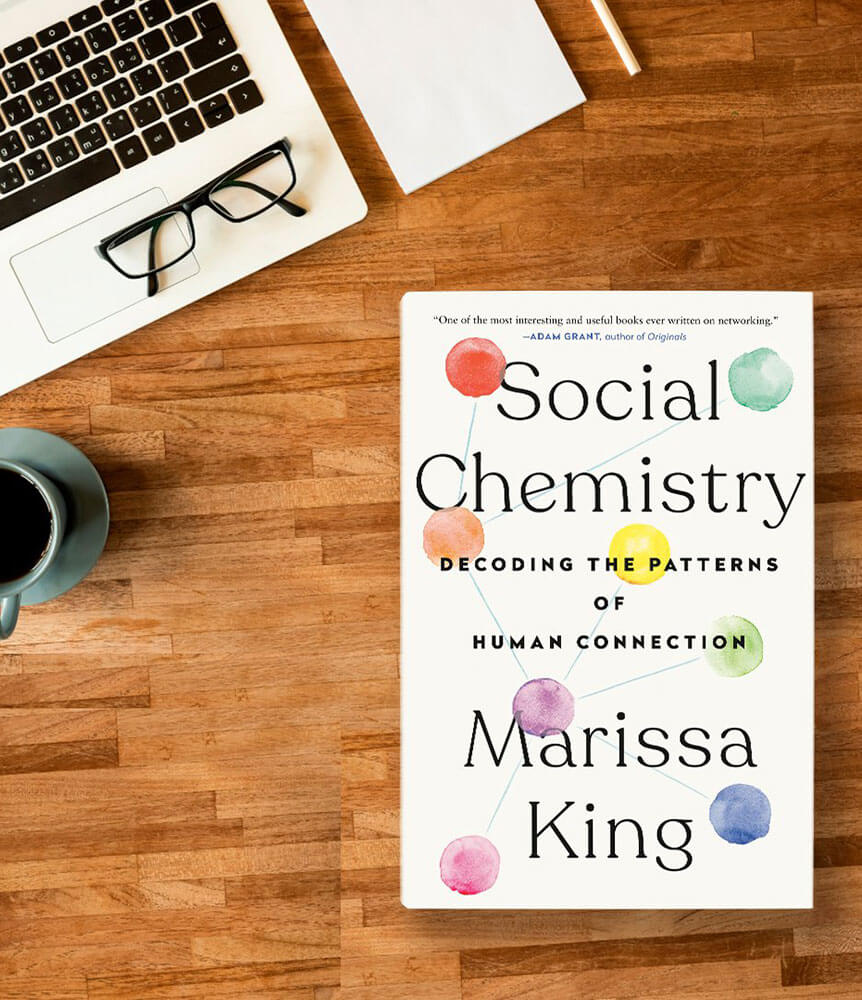
“If you’re trying to recreate online what happens when we spontaneously bump into someone at an events — those casual hallway conversations — they’re really, really difficult to recreate,” said sociologist Marissa King, (Courtesy Team Good, LLC)
When Convene reached out to arrange an interview with Marissa King, a professor of organizational behavior at the Yale School of Management, we left the decision whether to talk by phone or Zoom in her expert hands. King, a sociologist, has studied the evolution of social networks for more than 15 years, and is the author of the recently published book, Social Chemistry: Decoding the Patterns of Human Connection.
King went with a phone call. “There’s really no substitute for face-to-face interaction — and that’s particularly true when people are meeting for the first time,” she told Convene. But when that’s not possible, communicating by voice alone is much more effective than video in creating social connection, in large part, because “it improves the senses of empathic accuracy,” she said. “And we can actually listen far better.”
We spend a lot of time trying to read nonverbal cues and nonverbal behavior on platforms like Zoom, “which is actually really, really hard to do,” she said. The distractions of trying to read facial expressions while also trying to look at the camera “make it much harder to connect.”
King’s book is packed with insights gleaned from her own and others’ research about how our networks affect our professional, personal, and shared lives, including many that run counter to what we may have assumed to be true. For example, it is the structure — not the size — of your network that has the most influence on how it impacts your personal and professional lives. Most people’s networks fall into one of three categories — expansionists, brokers, and conveners — and each have drawbacks and benefits.
King’s book was finished and in the publisher’s hands before the pandemic began. She spoke with Convene about what she has learned about the effect the pandemic has had on our networks, and how the forced move to digital meetings might impact our connection in the future.

Conferences are high on the list of places where we build our “outer acquaintance networks” — and that’s where new ideas and new information come from, said Marissa King. (Jacob Slaton Photography)
When you measured people’s networks a year after the pandemic, you found that they had shrunk. Could you talk about the effect that the pandemic has had on the size of our networks?
When we studied networks prior to the pandemic and then looked at the same people’s networks again a year later, we found that networks had shrunk overall by close to 16 percent — but that was almost entirely due to reduction in the size of men’s networks. Men’s networks had shrunk by close to 30 percent, which translates to roughly 450 people.
It’s not that women have spent more time maintaining their networks — we know that women have been more time-crunched during the pandemic [than men] — but that men and women actually spend time quite differently when they’re either cultivating relationships or trying to maintain them. Men tend to develop and maintain relationships by doing things together. They may go for a drink together, or they may play basketball together. Women tend to maintain relationships through conversation. Conversation hasn’t been impeded [by the pandemic], but our ability to do things together has and that’s had a disproportionately negative effect on men.
In thinking about the [meeting] space or about creating the opportunities for people to come together, it really does highlight how critical the ability to engage in shared activities are for people, and particularly for men. For everybody, that ability to be doing things together is really, really key to maintaining our social connections.
One of the things that stood out to me when I researched your work is the fact that when our networks shrink, we get less information. As an academic, have you noticed any changes in your ability to produce knowledge and insights because of not being able to get together to talk over coffee?
To your first point, that’s exactly right. So, if we look at where our networks are strong, it’s the people that we would meet at a conference or a professional event or a coffee shop — the people that are really in our outer acquaintance networks — where we see the most shrinkage. And our outer network is particularly important because that’s where new ideas and new information come from.
If you look at our networks during the pandemic, what’s happened is that we’ve naturally focused on our inner core of social relationships. It makes perfect sense — and we’ve seen that after other crises. After Hurricane Katrina and other catastrophes, people focus on the people that they’re closest to because that’s where we get emotional support from. That’s where our sense of mental health and resiliency really comes from, but it’s at the expense of getting new information and new ideas.
In thinking about my own personal life, I think that that is certainly true. I span lots of different arenas. I spend a lot of time talking to people, for instance, in medicine and mental health, but also to people in business schools. And it’s been really difficult, particularly, to get a pulse of what’s changing in the world of work, because many of the conversations I would have, whether that’s in the classroom or at speaking events, just aren’t happening. The world has changed so much in the way that we’re working and how people are doing at work, and it’s really hard to imagine [those changes] when you’re sitting at home in front of your computer, talking to the same set of colleagues that you talk to every Tuesday at noon.
There’s been a lot of experimentation with trying to recreate those kind of serendipitous encounters online for digital meetings. Some people have tried setting up interactions that are similar to speed dating, where you spend a few minutes in a video chat with another participant. Can that create social bonds?

Marissa King’s book is packed with insights gleaned from her own and others’ research about how our networks affect our professional, personal, and shared lives.
It’s extraordinarily difficult to engineer what is supposed to be spontaneous human interaction. If you’re trying to recreate online what happens when we spontaneously bump into someone at an events — those casual hallway conversations — they’re really, really difficult to recreate.
I would say that what those types of interactions can do well is to create a change in positive affect — they can leave us feeling more happy. In human connection, if it’s done well in the moment, we get a chemical burst that leaves us walking away feeling more positive. But what’s difficult with those types of interactions is actually getting them to sustain and continue in a way that translates into an enduring relationship. To do that piece well, something has to happen in the conversation where there’s a sense of purpose or that there’s this connection that we identify in some way and choose to keep that connection going. And I think that that’s where we can think about ways of making those conversations more intentional or purposeful to help move it beyond just like, “Oh, I really enjoyed that,” and translating into more enduring relationships.
One of the benefits that’s come as a result of the forced move to digital meetings is the fact that it’s made it much easier for people in different geographic areas to come together. What are your thoughts about digital forums and the future of meetings?
I would argue that there’s really no substitute for people coming together face to face. But the experience of the past year has shown us what the possibilities are of creating different types of experiences and being able to harness technology to have more effective events moving forward — ones that we wouldn’t have been able to do in the past, or at least, people weren’t doing in the past.
A global reach means that who’s represented in the room changes. There’s the ability to make knowledge more accessible to people who couldn’t afford to travel or simply don’t have the time. There’s an ability now to have many, many, many more people in the room that would not have been there previously.
I think another benefit is also that it’s not just who’s in the room that changes, but the ability to connect with other people changes. We kind of know the upper limit of doing that well is around four to six people, but you can put people in a small breakout room to have a conversation that allows for people to truly learn and digest and apply new information in a way other than simply listening to a speaker. That’s a very different type of learning and an opportunity for people to meet one another.
And there’s more equality — women tend to be included in conversations that are happening virtually more often than they do in ones that are face-to-face. So, there’s an opportunity for more interactions and more equitable interactions online.
And then finally — this is where I get really excited — is that it’s become really clear just how different people’s preferences are for different types of interactions. I think that we can start designing events that allow for the person who wants to have random coffee conversations and to speed date, but at the same time, for the people who feel more comfortable in a small group conversation, talking about a challenge that they’re facing at work. All of that becomes possible in a way that is much more difficult if you’re trying to organize it only in a physical environment.
It’s not that you have to choose one — in-person or digital — but that you can put these two things together?
The ability to have the conversation continue when the event’s over, that’s a radical shift. If there happened to be a transformative conversation among a small group of four people that might change an industry or change the way people approach a problem, the ability to provide a forum to have that conversation continue, whether it means continuing to bring in new people or have that group keep going, is really helpful.
Do you think, once the restrictions on people gathering go away, that networks will regain their former size organically? Or do you think there will be a fundamental change in networking as a result of the pandemic?
What we know from other contexts is that our networks naturally tend to get smaller and smaller over time. And this is why you see such a crisis of loneliness, particularly in the elderly — networks just naturally just shrink over time. That’s in response to natural life transitions, but it also can be in response to trauma or catastrophes like we’ve experienced during the pandemic.
My fear and my concern are that if we don’t make a conscious effort in reconnecting and reinvesting in our networks and in our relationships, that they will not recover. But one of the silver linings of COVID is that we’re far more aware of just how important our relationships are than we ever have been in the past. And my hope is that our longing and the downsides of being in such a high level of social isolation will make us willing and conscious about reconnecting. But if we don’t, I think that the effects are likely to be enduring.
EARN CMP CREDIT
Earn one clock hour of certification by visiting the Convene CMP Series web page to answer questions about information contained in Convene‘s May-June cover story, “Real-Life Examples Show the Importance of In-Person Events.” The Certified Meeting Professional (CMP) is a registered trademark of the Events Industry Council.
How You Can Learn to Like Networking
Barbara Palmer is deputy editor at Convene.
